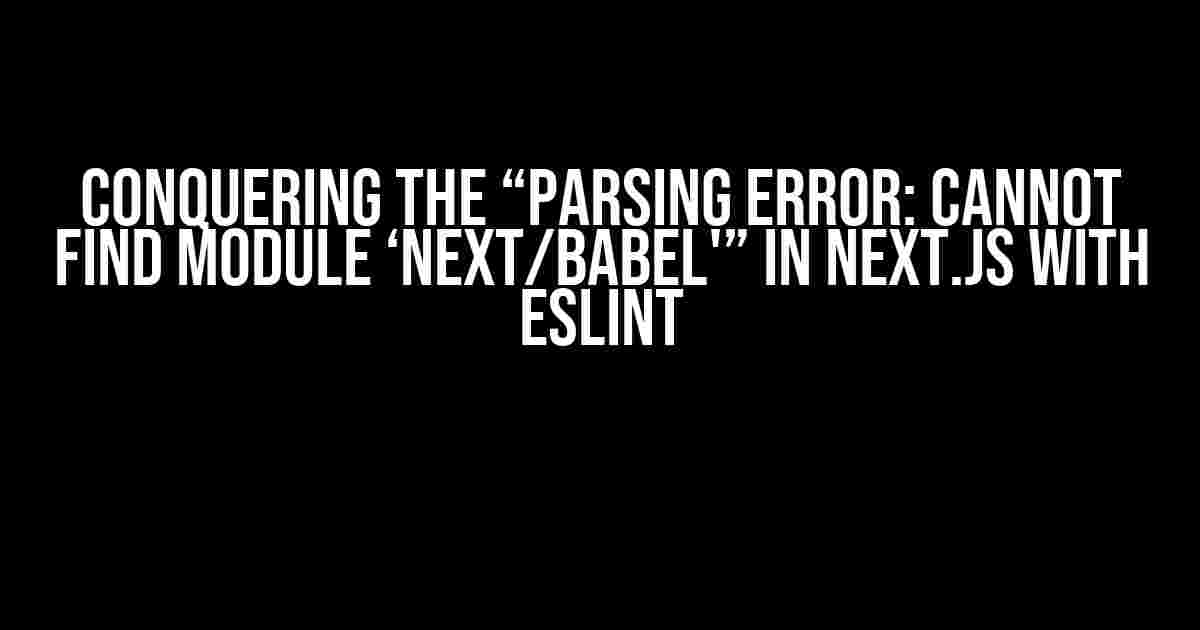Are you tired of encountering the frustrating “Parsing error: Cannot find module ‘next/babel'” in your Next.js project, especially when using ESLint? You’re not alone! This error can be a real showstopper, but fear not, dear developer, for we’ve got you covered. In this comprehensive guide, we’ll delve into the nitty-gritty of this error and provide you with clear, step-by-step instructions to resolve it once and for all.
What is the “Parsing error: Cannot find module ‘next/babel'”?
The “Parsing error: Cannot find module ‘next/babel'” occurs when ESLint tries to parse a file in your Next.js project but can’t find the required ‘next/babel’ module. This module is responsible for transpiling modern JavaScript code into browser-compatible code, which is essential for Next.js to function correctly.
There are a few reasons why this error might occur. Here are some common culprits:
- ESLint configuration issues
- Incompatible or outdated dependencies
- Incorrect file paths or structures
Resolving the Issue: A Step-by-Step Guide
To resolve the “Parsing error: Cannot find module ‘next/babel'”, follow these steps:
Step 1: Check Your ESLint Configuration
The first step is to review your ESLint configuration file, usually named `.eslintrc.json` or `.eslintrc.js`. Look for the following settings:
{
"parserOptions": {
"ecmaVersion": 2020,
"sourceType": "module",
"ecmaFeatures": {
"jsx": true
}
},
"plugins": ["react"],
"extends": ["eslint:recommended", "plugin:react/recommended", "next"],
"rules": {
"react/react-in-jsx-scope": "off"
}
}
Make sure you have the `next` plugin included in the `extends` array and the `react` plugin is also present. If not, add them to your configuration file.
Step 2: Verify Your Dependencies
Next, let’s check the dependencies in your `package.json` file:
"devDependencies": {
"eslint": "^7.12.0",
"eslint-plugin-next": "^12.0.1",
"eslint-plugin-react": "^7.23.0",
"babel-eslint": "^10.1.0"
}
Ensure you have the correct versions of ESLint, ESLint-plugin-next, ESLint-plugin-react, and babel-eslint installed. You can do this by running `npm install` or `yarn install` in your project’s root directory.
Step 3: Correct File Paths and Structures
Now, let’s review your file structure and paths:
project/
pages/
index.js
components/
header.js
footer.js
node_modules/
eslint
eslint-plugin-next
eslint-plugin-react
babel-eslint
.next/
...
package.json
.eslintrc.json
Verify that your ESLint configuration file is in the root of your project, and your `pages` and `components` directories are correctly structured.
Troubleshooting Common Issues
If you’ve followed the steps above and still encounter the error, here are some additional troubleshooting tips:
Issue 1: Incompatible ESLint and babel-eslint versions
If you’re using an older version of ESLint (< 7.0.0), you might need to upgrade to a compatible version. Check your `package.json` file and update ESLint and babel-eslint to the latest versions:
"devDependencies": {
"eslint": "^7.12.0",
"babel-eslint": "^10.1.0"
}
Issue 2: Missing or incorrect ESLint plugin configurations
Double-check that you have the correct ESLint plugin configurations in your `.eslintrc.json` file. Ensure you have the `next` and `react` plugins included:
"plugins": ["react"],
"extends": ["eslint:recommended", "plugin:react/recommended", "next"]
Issue 3: File path issues in ESLint configuration
Verify that your ESLint configuration file has the correct file paths. If you’re using a custom configuration file, ensure it’s properly referenced in your `package.json` file:
"scripts": {
"lint": "eslint --config .eslintrc.custom.js"
}
Issue 4: Next.js version incompatibilities
If you’re using an older version of Next.js (< 9.0.0), you might need to upgrade to a compatible version. Check your `package.json` file and update Next.js to the latest version:
"dependencies": {
"next": "^12.0.1"
}
Conclusion
| Common Errors | Solutions |
|---|---|
| ESLint configuration issues | Review and update ESLint configuration file (.eslintrc.json or .eslintrc.js) |
| Incompatible or outdated dependencies | Update ESLint, ESLint-plugin-next, ESLint-plugin-react, and babel-eslint to compatible versions |
| Incorrect file paths or structures | Verify file structure and paths; ensure ESLint configuration file is in the project root |
Frequently Asked Question
Got stuck with the infamous “Parsing error: Cannot find module ‘next/babel'” error in Next.js? Fear not, friend! We’ve got the answers to get you back on track!
Q1: What causes the “Parsing error: Cannot find module ‘next/babel'” error?
This error typically occurs when ESLint can’t find the ‘next/babel’ module, which is required for Next.js to work its magic. This might happen when you’ve recently upgraded or downgraded Next.js, or if there’s an issue with your project’s configuration.
Q2: How can I resolve the error by reinstalling Next.js?
Try running npm uninstall next or yarn remove next, followed by npm install next or yarn add next. This should reinstall Next.js and its dependencies, including the ‘next/babel’ module.
Q3: What if reinstalling Next.js doesn’t work?
In that case, try deleting the node_modules folder and running npm install or yarn install again. This will ensure that all dependencies, including ‘next/babel’, are properly reinstalled.
Q4: Can I disable ESLint’s parsing of Next.js files?
Yes, you can! Add the following configuration to your .eslintrc.json file: "ignorePatterns": ["**/pages/**/*", "**/components/**/*"]. This will tell ESLint to ignore your Next.js files, preventing the parsing error.
Q5: Are there any other possible causes for this error?
Yes, there could be other factors at play. Make sure your next.config.js file is properly configured, and that you’re using the correct version of Next.js and its dependencies. You can also try updating your babel.config.js file or checking for any conflicts with other plugins or dependencies.

